|
|
|
Sort Order |
|
|
|
Items / Page
|
|
|
|
|
|
|
| Srl | Item |
| 1 |
ID:
151556
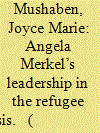

|
|
|
|
|
| Summary/Abstract |
“What Merkel’s critics underestimate is the extent to which her proactive policies of the past decade encouraging integration and ‘intercultural opening’ have produced an even bigger paradigm shift...”
|
|
|
|
|
|
|
|
|
|
|
|
|
|
|
|
| 2 |
ID:
146277
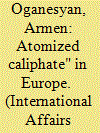

|
|
|
|
|
| Summary/Abstract |
A PART OF THE WESTERN WORLD, Europe, however, has been very selective about alien cultures and civilizations; not a "melting pot" American style, it is paying dearly for this function imposed on it. The disagreements on the migration issues in the European corridors of power threaten the cohesion of the European Unity. Frau Merkel who demonstrated a no mean determination to meet a new wave of migrants with maximal openness and tolerance had already accepted the failure of mul-ticulturalism.
|
|
|
|
|
|
|
|
|
|
|
|
|
|
|
|
| 3 |
ID:
126327
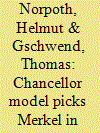

|
|
|
|
|
| Publication |
2013.
|
| Summary/Abstract |
In the German national election this fall, based on the forecast of the Chancellor Model, the governing coalition will score a resounding victory. Chancellor Angela Merkel enjoys a high approval rating, which puts her at a 2-1 advantage over the challenger, Peer Steinbrück. Although Germany is not a presidential system, where voters elect the chief policymaker, chancellor support has proved to be a strong predictor of vote choice in German national elections. Our forecast model also includes long-term partisanship, which provides a broad base for the governing parties in this election, and length of tenure, which exacts a modest penalty after two terms of office. Since its premiere in 2002, the model has predicted the winner in each election. In a case of perhaps beginner's luck, the 2002 forecast scored a bull's-eye with 47.1%, the exact share of the governing parties; the forecast was posted three months before Election Day. No poll or other model, not even the Election-Day exit polls, came close to this performance; in fact, most people predicted a defeat for Schröder's red-green coalition (Norpoth and Gschwend 2003).
|
|
|
|
|
|
|
|
|
|
|
|
|
|
|
|
| 4 |
ID:
127492
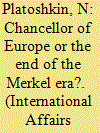

|
|
|
|
|
| Publication |
2013.
|
| Summary/Abstract |
IN GERMANY and outside it, the media spoke and wrote about the results of the German federal elections of September 22, 2013 as a personal triumph of Angela Merkel, the FRG Chancellor since 2005. Journalists hastened to tag her the "Chancellor of Europe." But was she really?
In 2009 and 2013, Angela Merkel led her party to federal elections under the slogan of a right-center coalition (which she personally preferred) with the liberal Free Democratic Party (FDP) which had moved further right on economic issues. In 2009, the German burghers frightened to death by the global financial crisis and financial collapse of several of the Eurozone countries preferred not to change horses in midstream: they voted Merkel. The 2009 elections, however, are better described as a triumph of Free Democrats who showed the historically best 14.8%. Those who voted FDP believed that the "bourgeois-minded" parties are much better suited to look after the country's economy than the "spendthrift" left. The FDP even promised lower taxes on businesses and natural persons.
|
|
|
|
|
|
|
|
|
|
|
|
|
|
|
|
| 5 |
ID:
093678
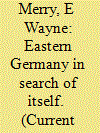

|
|
|
|
|
| Publication |
2010.
|
| Summary/Abstract |
The roots of the east's continuing alienation lie in the enforced, prolonged isolation that its society endured during most of the cold war.
|
|
|
|
|
|
|
|
|
|
|
|
|
|
|
|
| 6 |
ID:
113133
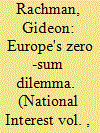

|
|
|
|
|
| Publication |
2012.
|
| Summary/Abstract |
EUROPE'S DEBT crisis is threatening a political order that has been built up over the course of more than a half century. It is still entirely possible-indeed likely-that the European single currency will not survive the crisis. Angela Merkel, the German chancellor, has predicted that if the euro collapses, the European Union will crumble with it. The destruction of the EU would, in turn, remove the organization around which postwar European politics has been constructed.
|
|
|
|
|
|
|
|
|
|
|
|
|
|
|
|
| 7 |
ID:
187255
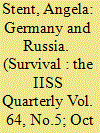

|
|
|
|
|
| Summary/Abstract |
Following Russia’s invasion of Ukraine, German Chancellor Olaf Scholz appeared to jettison 50 years of Ostpolitik by pledging financial and military support for Ukraine, sanctioning Russia and promising to spend more on defence. Seven months into the war, progress on the German Zeitenwende (turning point) is mixed. Germany has sustained far-reaching sanctions and is grappling with weaning itself off Russian energy, but military deliveries to Ukraine have been slow. The German public continues to support Ukraine, but as winter approaches that support could erode, since Russia has tied future gas deliveries to the lifting of sanctions.
|
|
|
|
|
|
|
|
|
|
|
|
|
|
|
|
| 8 |
ID:
138601
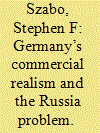

|
|
|
|
|
| Summary/Abstract |
Russia’s annexation of Crimea and its attempts to destabilise Ukraine resemble traditional geopolitics and have prompted references to a ‘new Cold War’, but this comparison overlooks the transformation in the nature of international affairs brought about by globalisation, and its implications for Berlin’s relationship with other Western capitals, as well as Moscow. We are in an era of commercial realism, and Germany is the kind of prototypical geoeconomic power that challenges the old type of military-based power embodied by the United States and Russia. Moscow’s use of, and threat to use, military force in Ukraine are only part of the opening phase in a much longer game, one in which economic interdependence will be decisive.
|
|
|
|
|
|
|
|
|
|
|
|
|
|
|
|
| 9 |
ID:
137303
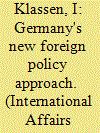

|
|
|
|
|
| Summary/Abstract |
THE 50TH MUNICH SECURITY CONFERENCE heard vague hints from the new governing coalition about a significant evolutionary change in Federal Germany's foreign policy strategy. Germany's Foreign Minister Frank-Walter Steinmeier said that his country "must be ready for earlier, more decisive and more substantive engagement in the foreign and security policy sphere.
|
|
|
|
|
|
|
|
|
|
|
|
|
|
|
|
| 10 |
ID:
115011
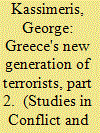

|
|
|
|
|
| Publication |
2012.
|
| Summary/Abstract |
On 2 November 2010, the Greek government took the unprecedented step of suspending international airmail for 48 hours after a wave of parcel bombs targeting the German Chancellor, Angela Merkel, the Italian premier Silvio Berlusconi, and the French President Nicholas Sarkozy as well as a number of foreign embassies in Greece and across Europe caused a major security scare. Responsibility for the parcel bombs campaign, which placed European counterterrorism authorities on high alert, was claimed by the Greek anarchist-oriented guerrilla group, Conspiracy of Cells of Fire (CCF). Since its emergence in 2008, CCF has become one of the most active of Greece's new generation of urban guerrilla groups. This article examines CCF's campaign of violence and explains its selection of targets and the nature of its organizational and operational development.
|
|
|
|
|
|
|
|
|
|
|
|
|
|
|
|
| 11 |
ID:
131864
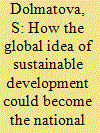

|
|
|
|
|
| Publication |
2014.
|
| Summary/Abstract |
HALF A DECADE has passed since the beginning of the global financial and economic recession in 2008. In this period, significant events have taken place and important trends have emerged, making it possible to review the preliminary results. This is being done not only by researchers and experts, but also at high-level social and political forums.
|
|
|
|
|
|
|
|
|
|
|
|
|
|
|
|
| 12 |
ID:
152667
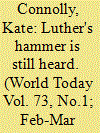

|
|
|
| 13 |
ID:
131836
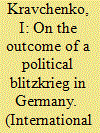

|
|
|
|
|
| Publication |
2014.
|
| Summary/Abstract |
THE VICTORY of Angela Merkel and the CDU/CSU bloc she led in the Bundestag elections of September 22, 2013 (41.5%) was expected and quite predictable1 - and therefore it came as no surprise to anyone. Significantly, this time around the Germans were not even electing a party, but a concrete leader with whom solely in a personal capacity are associated hopes for stability and firm-handed state management. What did come as a bit of a surprise was the defeat of the FDP, Christian Democrats' former ruling coalition partners, who with 4.8 percent fell out of big politics.
|
|
|
|
|
|
|
|
|
|
|
|
|
|
|
|
| 14 |
ID:
126326
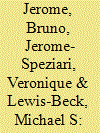

|
|
|
|
|
| Publication |
2013.
|
| Summary/Abstract |
Our political economy model has correctly forecasted the 1998 and 2005 elections. However, in 2002 we predicted a tight race to the benefit of the Christian Democrats(CDU)/Christian Socialists(CSU)-Free Democratic Party (FDP) opposition, so underestimating the narrow defeat of the FDP by the Green Party. In the German political system, proportional representation makes single-party domination almost impossible. On the contrary, the big parties, Social Democratic Party (SPD) or CDU/CSU, are pushed to build a majority coalition. In this competition, the FDP has been the "pivotal party" in German political life, at least until 2002. Since then, the Greens have challenged the FDP, with the Ecologists allowing the SPD to form a red-green coalition in 1998 and in 2002. Similarly, in 2005 the FDP was not associated with the grand coalition driven by Angela Merkel.
|
|
|
|
|
|
|
|
|
|
|
|
|
|
|
|
| 15 |
ID:
125022
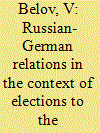

|
|
|
|
|
| Publication |
2013.
|
| Summary/Abstract |
IN 2013, special attention is focused on the state and prospects of the whole complex of relations between Russia and Germany: parliamentary elections in Germany, scheduled for September 22, 2013, will usher in a new four-year period of our cooperation. Naturally, such a division into periods is formal and is associated with a possible change of government in Germany. It is very likely that the upcoming elections will result in a new government, which will determine the main parameters of Germany's foreign policy, including its policy towards Russia.
|
|
|
|
|
|
|
|
|
|
|
|
|
|
|
|
| 16 |
ID:
141448
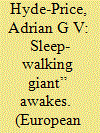

|
|
|
|
|
| Summary/Abstract |
A quarter of a century after the fall of the Berlin Wall, the role of the Bundesrepublik in Europe is once again the focus of international scrutiny and academic debate. Having long been seen as a “reflexive multilateralist” and “tamed power”, with a “leadership avoidance reflex” and a “civilian power” strategic culture, the Eurozone crisis has pushed the Berlin Republic into the role of “reluctant hegemon”. At the same time, however, Germany has been widely criticized by its EU and NATO partners for its half-hearted commitment to the Afghan war and its failure to support its allies in the Libyan intervention. Prompted by a call by Federal President Joachim Gauck in 2013 for Germany to live up to its international responsibilities, new themes in foreign and security policy have recently emerged. At the Munich Security Conference in February 2014, a more active and engaged approach was outlined by both the Foreign and Defence Ministers. This paper will examine recent shifts in the discourse of German foreign and security policy, and considers the extent to which these have been accompanied by significant shifts in policy outcome and implementation – particularly in the light of the Ukrainian crisis.
|
|
|
|
|
|
|
|
|
|
|
|
|
|
|
|
| 17 |
ID:
166023
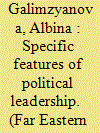

|
|
|
|
|
| Summary/Abstract |
This article describes political leadership in China and Germany. The author examines the political culture of modern China since the inception of the PRC, as well as the political culture of Germany. The author comes to the conclusion that the political and cultural development of a country is in close connection with the personality of its leader, whose individual traits influence its position in the international arena.
|
|
|
|
|
|
|
|
|
|
|
|
|
|
|
|
| 18 |
ID:
132149
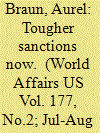

|
|
|
|
|
| Publication |
2014.
|
| Summary/Abstract |
This spring, as Russia's puppet government in Crimea moved clocks forward two hours to coincide with Moscow time, Vladimir Putin seemed intent on moving the historical clock backwards to the age of nineteenth-century Russian imperialism. As the leader of an economically weak and vulnerable country with a corrupt governing class, the Russian president acted with brazen disregard for international law and norms, while the democratic West played a totally reactive role, and a feckless one at that. Ignoring very reluctantly introduced, and very limited, sanctions, Putin reciprocated with utter contempt for capitalist democracies, where he believes profits will always trump principle, and especially for President Obama, who, in the Russian dictator's view, finds Western unity only in weakness, not in strength. But even though what appear to be irreversible faits accomplis occur every day in Crimea and eastern Ukraine, it is not too late for the West to seize the initiative, mobilize its vast economic and political capacity, and put Putin and the "yes" chorus of siloviki, who surround and encourage him, truly on the defensive.
|
|
|
|
|
|
|
|
|
|
|
|
|
|
|
|
| 19 |
ID:
131165
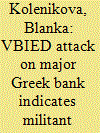

|
|
|
| 20 |
ID:
123253
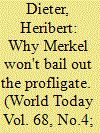

|
|
|
|
|
|
|
|